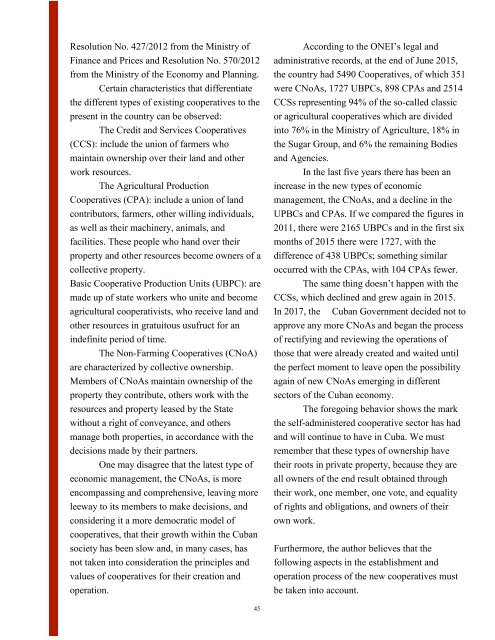CLC-Conference-Proceeding-2018
Create successful ePaper yourself
Turn your PDF publications into a flip-book with our unique Google optimized e-Paper software.
Resolution No. 427/2012 from the Ministry of<br />
Finance and Prices and Resolution No. 570/2012<br />
from the Ministry of the Economy and Planning.<br />
Certain characteristics that differentiate<br />
the different types of existing cooperatives to the<br />
present in the country can be observed:<br />
The Credit and Services Cooperatives<br />
(CCS): include the union of farmers who<br />
maintain ownership over their land and other<br />
work resources.<br />
The Agricultural Production<br />
Cooperatives (CPA): include a union of land<br />
contributors, farmers, other willing individuals,<br />
as well as their machinery, animals, and<br />
facilities. These people who hand over their<br />
property and other resources become owners of a<br />
collective property.<br />
Basic Cooperative Production Units (UBPC): are<br />
made up of state workers who unite and become<br />
agricultural cooperativists, who receive land and<br />
other resources in gratuitous usufruct for an<br />
indefinite period of time.<br />
The Non-Farming Cooperatives (CNoA)<br />
are characterized by collective ownership.<br />
Members of CNoAs maintain ownership of the<br />
property they contribute, others work with the<br />
resources and property leased by the State<br />
without a right of conveyance, and others<br />
manage both properties, in accordance with the<br />
decisions made by their partners.<br />
One may disagree that the latest type of<br />
economic management, the CNoAs, is more<br />
encompassing and comprehensive, leaving more<br />
leeway to its members to make decisions, and<br />
considering it a more democratic model of<br />
cooperatives, that their growth within the Cuban<br />
society has been slow and, in many cases, has<br />
not taken into consideration the principles and<br />
values of cooperatives for their creation and<br />
operation.<br />
According to the ONEI’s legal and<br />
administrative records, at the end of June 2015,<br />
the country had 5490 Cooperatives, of which 351<br />
were CNoAs, 1727 UBPCs, 898 CPAs and 2514<br />
CCSs representing 94% of the so-called classic<br />
or agricultural cooperatives which are divided<br />
into 76% in the Ministry of Agriculture, 18% in<br />
the Sugar Group, and 6% the remaining Bodies<br />
and Agencies.<br />
In the last five years there has been an<br />
increase in the new types of economic<br />
management, the CNoAs, and a decline in the<br />
UPBCs and CPAs. If we compared the figures in<br />
2011, there were 2165 UBPCs and in the first six<br />
months of 2015 there were 1727, with the<br />
difference of 438 UBPCs; something similar<br />
occurred with the CPAs, with 104 CPAs fewer.<br />
The same thing doesn’t happen with the<br />
CCSs, which declined and grew again in 2015.<br />
In 2017, the Cuban Government decided not to<br />
approve any more CNoAs and began the process<br />
of rectifying and reviewing the operations of<br />
those that were already created and waited until<br />
the perfect moment to leave open the possibility<br />
again of new CNoAs emerging in different<br />
sectors of the Cuban economy.<br />
The foregoing behavior shows the mark<br />
the self-administered cooperative sector has had<br />
and will continue to have in Cuba. We must<br />
remember that these types of ownership have<br />
their roots in private property, because they are<br />
all owners of the end result obtained through<br />
their work, one member, one vote, and equality<br />
of rights and obligations, and owners of their<br />
own work.<br />
Furthermore, the author believes that the<br />
following aspects in the establishment and<br />
operation process of the new cooperatives must<br />
be taken into account.



